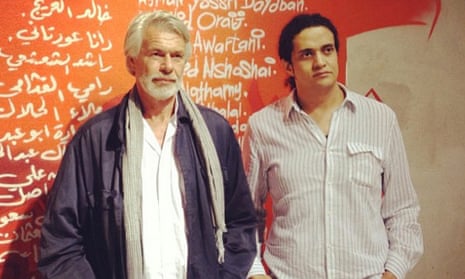Leading international cultural figures have joined human rights campaigners in calling for the release of Ashraf Fayadh, the Palestinian poet and artist facing execution in Saudi Arabia.
Chris Dercon, the director of Tate Modern, British poet laureate Carol Ann Duffy, historian Simon Schama, playwright David Hare, and Egyptian novelist and commentator Ahdaf Soueif are among the those calling for the death sentence imposed on Fayadh by a Saudi court last week to be overturned.
More than a dozen organisations for artists, writers, musicians and freedom of expression from the UK, North America and Africa – including Index on Censorship, literary association PEN International and the International Association of Art Critics – have also signed a joint statement condemning Fayadh’s conviction for renouncing Islam, a charge which he denies.
The statement, which will be delivered to the Saudi embassy in London by English PEN on Friday, says: “We believe that all charges against him should have been dropped entirely, and are appalled that Fayadh has instead been sentenced to death for apostasy, simply for exercising his rights to freedom of expression and freedom of belief.”
Amnesty International launched an urgent action on Tuesday to lobby for Fayadh’s release, which denounced his lack of legal representation as a violation of international and Saudi law.
Schama said: “Anyone with a conscience should abhor the sentence and shun those responsible as inhuman.”
Referring to the Hadith, the sacred text that reports what the prophet Muhammad said or approved, Duffy said: “The world can only remind the Saudi authorities of the words ‘My mercy overcomes my wrath’ – and where they are said to be written.”
Hare called on the Saudi ambassador to the UK, Prince Mohammed bin Nawaf bin Abdulaziz, to “join the now-universal condemnation of the arbitrary death sentence passed on the Palestinian poet, Ashraf Fayadh”.
Mona Eltahawy, an award-winning journalist and commentator on Arab and Muslim issues, said: “This is an outrageous violation of freedom of faith which as a Muslim, I hold dear and support unequivocally.
“It is beyond time to hold [Saudi Arabia] accountable for its awful human rights violations.”British artist Peter Kennard said: “Saudi Arabia wants to silence a great humanitarian poet and cultural organiser. We cultural workers must do all in our power in campaigning to free him. We must also demand that David Cameron takes a bit of time off from selling the Saudi regime fighter planes to state his abhorrence at the death sentence meted out to a poet.”
In a message to his supporters, Fayadh told Saudi artist Ahmed Mater on Monday: “I am grateful for everyone working on my behalf. To be honest, I was surprised because I felt alone here. I am in good health. I’m struggling to follow all the developments. People should know I am not against anyone here, I am an artist and I am just looking for my freedom.”
Fayadh, who co-curated a show at the 2013 Venice Biennale, was originally sentenced to four years in prison and 800 lashes for apostasy by the general court in Abha, a city in the south-west of the ultraconservative kingdom, in May 2014.
He has denied the charges, which stem from a book of his poetry and a complaint lodged by a man who accused him of making blasphemous remarks during an argument in a cafe in the conservative city.
But after his appeal was dismissed, Fayadh, a key member of the British-Saudi art organisation Edge of Arabia, was retried and a new panel of judges last week ruled that he should be executed. He was given 30 days to appeal the ruling.
Dercon, who met Fayadh during a trip to Saudi Arabia two years ago, said he was a victim of the power struggles among reformists, pragmatists and ultraconservatives in the Gulf state. The art historian praised the exhibition Fayadh curated in Jeddah in 2013, Mostly Visible, as “amazingly courageous”.
“Ashraf is someone who is outspoken and daring,” he added. “The show he put together was very daring.”
This article includes content provided by Instagram. We ask for your permission before anything is loaded, as they may be using cookies and other technologies. To view this content, click 'Allow and continue'.
Dercon also disputed the charge that Fayadh had pursued illicit relationships with women and stored pictures of them on his phone. He said the women concerned had been among the many female artists in the Jeddah show. “They were photographed with me, with Ahmed [Mater] and with Ashraf.”
Soueif said: “Ashraf Fayadh has been caught in a very earthbound power struggle. I very much hope that the Saudi judiciary sees that they cannot be at all certain of the good faith of the charges or the justice of the outcome. I’m sure they will do the right thing and release Ashraf Fayadh.”
This article includes content provided by Instagram. We ask for your permission before anything is loaded, as they may be using cookies and other technologies. To view this content, click 'Allow and continue'.
Sultan Sooud Al Qassemi, a leading commentator on Arab affairs and founder of the Barjeel art foundation in the United Arab Emirates, said: “Saudi Arabia has recently invested heavily in the cultural scene. Such an abhorrent death sentence against an artist and member of the cultural community is an irreconcilable step with regards to Saudi’s cultural ambitions. I hope that the Saudi authorities intervene to save this young man’s life.”
Saudi Arabia’s al-Watan news website quoted Fayadh’s brother-in-law, Osama Abu Raya, on Monday as saying that the poet plans to appeal the death sentence.
